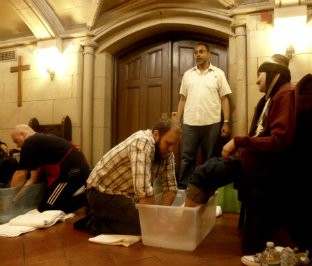Washing dirty feet

The feet and legs of the homeless men we serve at the Bowery Mission in New York are a testimony to the pain they endure daily. Many of their legs are swollen because, like Jesus, they have nowhere to lay their head to rest. They wander the streets and subways, ride on free casino buses, and sit in libraries and other public spaces.
Many men sleep upright a couple hours until they are asked to move on. They rarely sleep flat with their legs elevated, which would promote healthy blood circulation. Sometimes their legs are hardened so badly that they feel like stone or wood rather than flesh. Occasionally, we have to send these men to the hospital, where they are injected with blood thinners to reduce the swelling. One friend in our community, who went by the nickname Wheelchair Charlie, eventually had both legs amputated. Later, he died of complications related to blood clots.
Today I will lead the foot-washing service at the mission’s noon chapel. In recent years I’ve been joined in this by Uros Markovic, who plays gospel jazz every Friday night at the mission. This year my colleague Delon Ali, an ordained minister who was once homeless himself for several years, will bend low with me to wash the feet of our friends.
The Bowery Mission has a rich history. Charles Sheldon was a minister here when he wrote In His Steps, and it was here that Henry Louis Klopsch, an early director of the mission, created the red-letter Bible. Fanny Crosby wrote a lot of her famous songs here—we still have her piano!—and the first congregation to sing many of them was the homeless community that gathers here.
During the service today, a staff or community member will likely play songs such as “Blessed Assurance” and "Pass Me Not, O Gentle Savior” on the piano. Someone will surely read the foot-washing account from John 13. There are usually a couple of dozen people who come forward to have their feet washed. After each one, the tub is emptied and refilled with hot, soapy water. We also make sure there are plenty of towels and washcloths.
While many churches will have a foot-washing service today, a lot of their parishioners will arrive with their feet already clean. Our community members may shower twice a week, if they even make it to both shower days, and many have crusty socks, gnarled toes, and severely calloused feet. Our community sometimes shows up a bit funky, but I believe that is where God meets us—in the midst of our funk and mess and vulnerability. Over the years, many of the men have mentioned that they have never had someone wash their feet before.
Allowing someone to do this invites deep intimacy and trust. I recall one man saying the act felt “spiritual,” though he couldn’t quite explain why. Another said that he was now inspired to do something good for others. After thoroughly scrubbing one man’s feet, I looked up to see him crying. He said that he seldom has any sort of physical contact with others, and that he feels invisible as he walks the street.
Last year, while waiting for the tub to be refilled, I walked down the chapel aisle. One man was standing with his arms extended to the heavens, worshiping God. As I passed, he said that he had suffered from chronic pain in his shoulder for many years, and that during the service he felt miraculous healing.
The spirit of Jesus is present on the Bowery. It is humbling to have your feet washed—and it is humbling to wash others’ feet.




